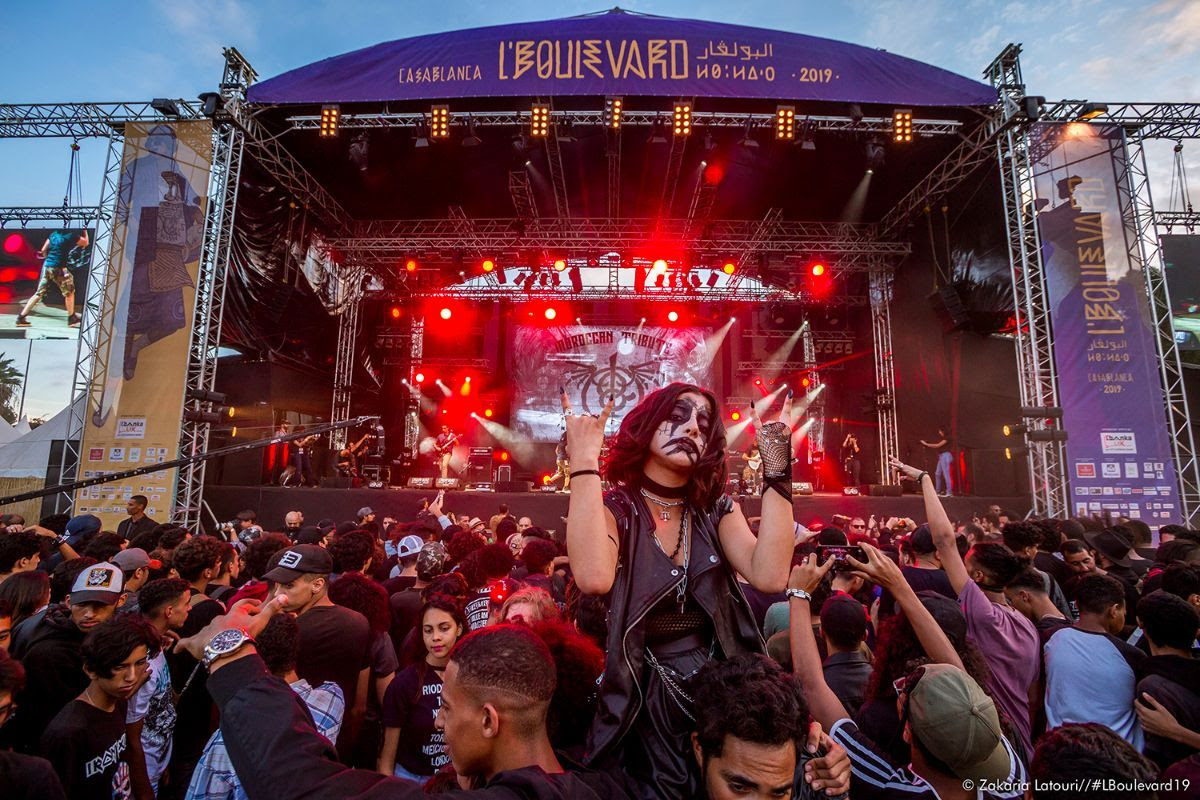Can a big festival remain independent if its existence depends on the competition of private brands that sponsor it? In Europe, no. In Morocco, yes. For more than fifteen years, the Casablanca event L’Boulevard has welcomed more than 100,000 festival-goers over four days. All without bar and ticket office. On the spot, we met the director of L’Boulevard Hicham Bahou in order to immerse ourselves in the context of Moroccan realities. | Interview by Polka B, Translation by Mdme SPKR
How did this idea of a great festival for alternative music come about ?
Hicham Bahou : At the start, we didn’t ask ourselves any questions. My colleague Momo was already stage manager at the theater of the Federation of Lay Works (FOL). I just gave a hand to friends who played in rock bands. It was a very small, widely dispersed scene. We organized concerts in all rotten conditions! The first thing to do was to create rehearsal studios. We had no ideas in mind. At the start, I had to work in advertising! By dint of slavery, we wanted to do something for live culture. There was nothing here, no “big sound”. Nothing at all.
What were the first concerts you organized ?
HB: Mainly metal concerts. A little punk. It was at the FOL in the early 2000s … It shocked! We enjoyed some freedom, but the place was still reserved for an elite. Little by little, the media began to take an interest in us. People hallucinated that this kind of concert could exist in Morocco. While this has always been the case! Morocco was a great hippie destination in the 60s. Many groups were formed according to the meetings. But all these initiatives were invisible since the musicians did not unite. In addition, the groups may be successful, they rarely lasted. When there is no scene, everything is harder!
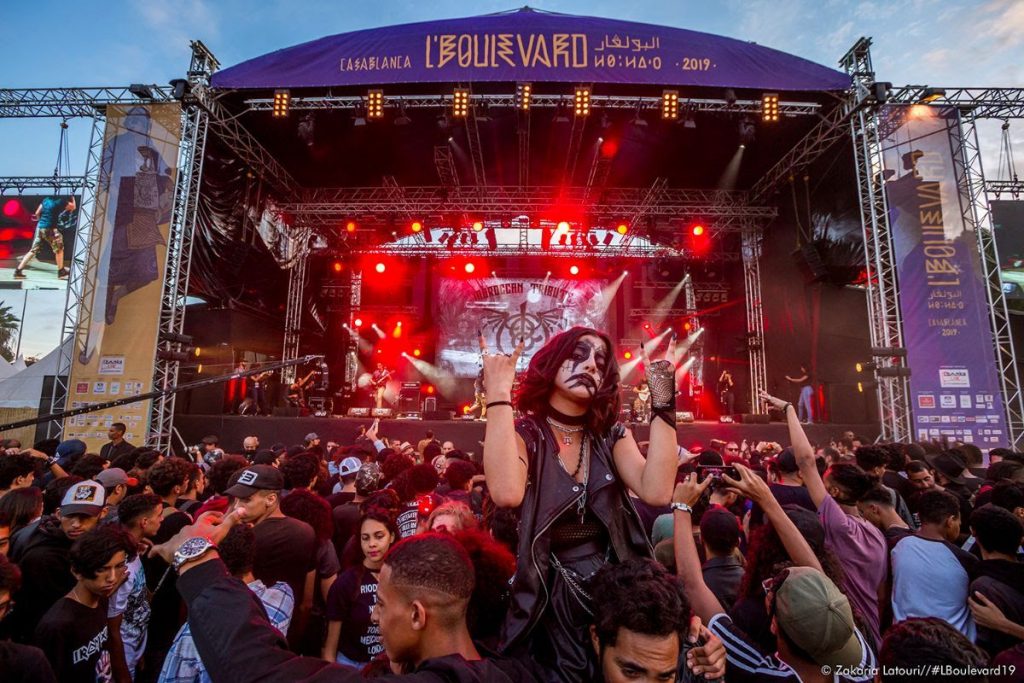
© Zakaria Latouri
When did you decide to think bigger?
HB: When the media made big files on alternative music, the first sponsors arrived to support us. With Momo, we wanted to stop “tinkering”. It was hard in our personal lives. Either we stopped or we started full-time. We chose the second option in 2006. The biggest job was to federate our entire team of volunteers. We are a real convoy! It represents people. We had to learn on the job, because we were all from trades that had nothing to do!
Why did you move the festival to the R.U.C rugby stadium ?
HB: In 2002, we found that the FOL was no longer suitable. The 400 places were taken, and 2000 people were waiting outside! There was a large intermediate window. It broke several times under pressure from people who wanted to get in. The boulevard was blocked, the cars could no longer pass … There was too much tension. So we directly moved the festival to the Racing Universitaire De Casablanca stadium (still hosting the event). Welcoming thousands of people on a large rugby field, all in open door … it scared me at first. In addition, it was in 2003. The year of the famous case of “so said satanist ” in the middle of Moroccan metal. The people who had been charged were really part of our tribe. Some remained imprisoned for more than a month … In response, the solidarity movement was enormous. Lots of people who weren’t usually meeting have joined to support them. This affair has definitely strengthened the scene. It opened the eyes of Moroccans. Not just in metal and punk, but in the whole alternative culture which also includes hip-hop. Young people had something to say. They had to express themselves. In 2005 and 2006, we welcomed more than 160,000 people throughout the festival. Today, we welcome 100,000 to 120,000 people.
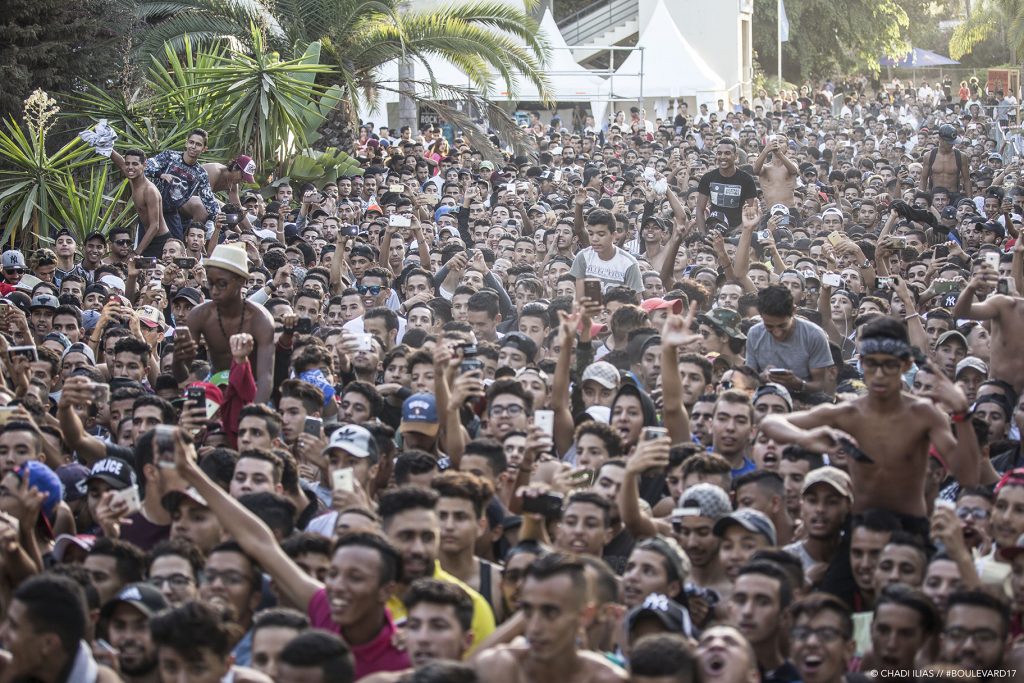
© Chadi Ilias
How do you go from a small hall to a stadium in just a year ?
HB: We have developed our skills gradually. In terms of technique, production, and logistics. Fortunately, we were able to find partners who accompanied us. We came from “communication”, so we mastered this language. We managed to negotiate with them in order to guarantee the total independence of the festival. We have always imposed our own constraints. The goal was to offer a free public event. It’s not nothing ! In Europe, festivals’s economy is based mainly on the sale of alcohol, subsidies and ticketing. At the L’Boulevard Festival, we do not benefit from any of these sources.
Hence the sponsorship …
HB: In our situation, this was the only solution that was within our reach. That questions a lot of my European friends. Many tell me that I am not independent because I depend on brands. I tell them it’s like that in your country. Not here ! In our context, the brand is only present for one week. Then it leaves! We sell it space, and we run the festival with the benefits of this sale. That’s all. These brands have no control over what we do. From the start, we decide everything. It’s a difficult choice. This leads us not to eat sometimes … But we assume. I remind you that the festival is free. If not, we would target only an elite.
Does your great challenge and goal remain to support the local scene ?
HB: Of course. We are not a headlining festival. We program headliners to help us gather more public . It also helps us to highlight young groups on the springboard scene. Without forgetting the confirmed Moroccan groups! Those who insure, but who are not yet known. The international side of our programming is very important. We want artists to meet and exchange with each other. We want to arouse curiosity. There are certain types of artists that the public can only see at L’Boulevard. Alternative and atypical artists who are not played on the radio. It is a relationship of trust that we have with the public.
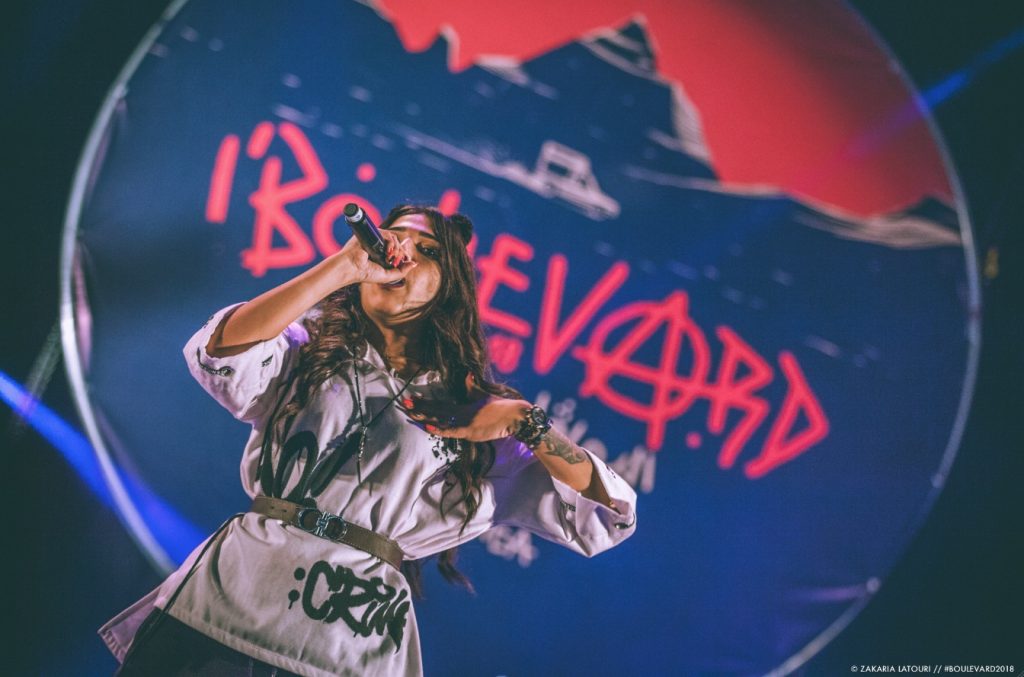
© Zakaria Latouri
In the rap field, it seems that the Moroccan public is more interested in its local representatives than foreign artists. Last night, for example, there were more people for the young Casablancais Dollypran than for the Europeans from Dope D.O.D (September 13, 2019, Editor’s note)!
HB: It’s true. Today in the rap scene, the headliners are Moroccan artists. We have ended our evenings with local artists since 2013. They are the ones who keep the public on site! Some artists like Dizzy Dros are really eagerly awaited. Dollypran may be younger, the craze is real. The current trap generation is very dynamic. Some French people don’t realize it. Out of ignorance, they have a slightly kitsch vision of Moroccan music. Alternative scenes are not exported at all! That’s why they’re so interesting. The Hoba Hoba Spirit group does very little touring in France when it fills stadiums here! They even toured the United States …
This is surprising, because the Moroccan community is very present in France and in Belgium. I believe that European festivals do not want to program this type of band because it is not what is “expected”. They have a lot of preconceived ideas about our scene. It is a shame, because Moroccan groups must necessarily consider an international career if they want to develop. Things are changing but there is still a lot of work. I come back to the lack of structures. It’s very difficult to do something without venues to play at. We try to compensate for this throughout the year with our “Le Boultek” room, but it is not enough.
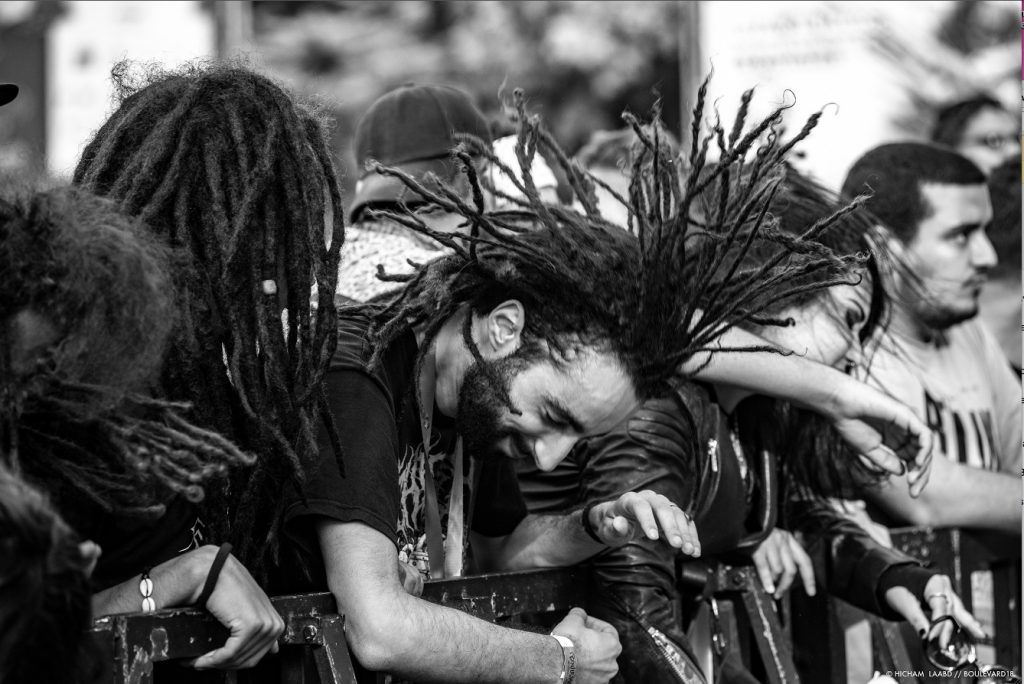
© Hicham Laabd
Given the scale of the improvements to be made, what ideal does the festival demand ?
HB: At our level, we try to bring a little more egalitarianism. I see that in France, many people complain about the cultural policies that are carried out. I am not saying that these problems do not exist, but this situation is incomparable with ours. Contexts have nothing to do with it. We are starting from scratch. There is no dynamic. In front of this emptiness, people took refuge in the screens of smartphones. We opted for free entry to help people get used to show interest in culture. When we organise concerts in halls, we keep the ticket at prices ranging between 2 and 4 euros. This is first to cover the costs. In order for people to be ready to pay for culture, there is a whole education to be made. We are not there yet. I would like to remind you that if our festival exists, it is also because many artists have accepted to play the game by lowering their fees. Someof them even performed for free.
It’s always a challenge to bring people back. We’ve been hosting a little less for the past few years … It seems to me that with streaming, people travel less. They have less need to “live” things … But this subject goes beyond Morocco. This is a much more global problem!
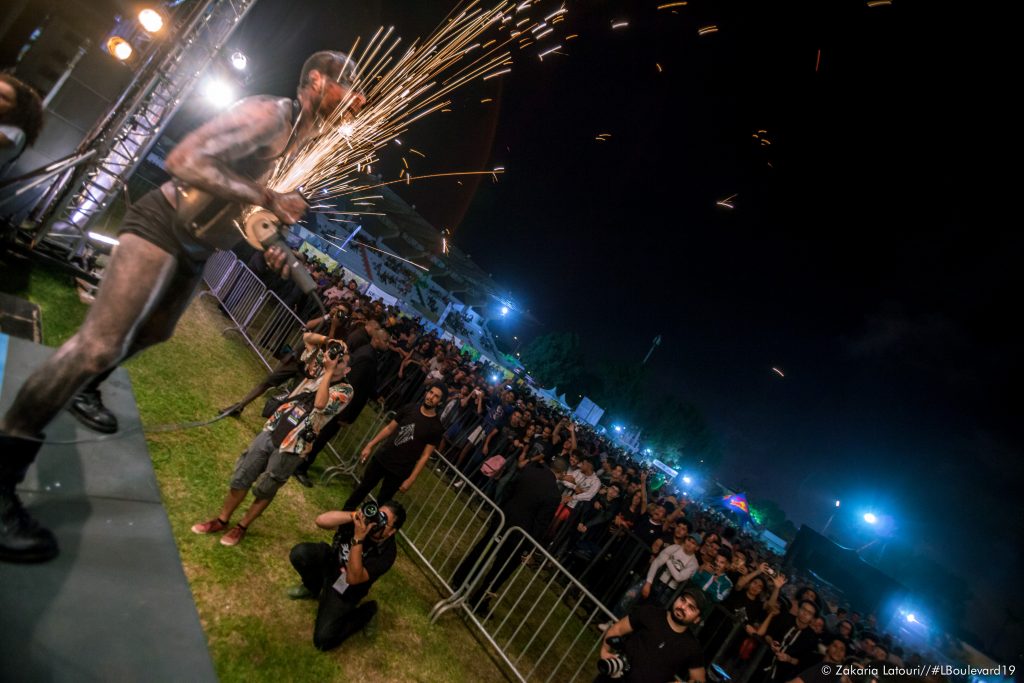
© Zakaria Latouri
